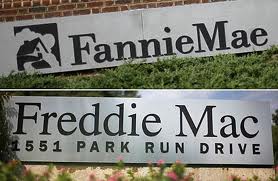 (Reuters) - It's not that the U.S. housing industry believes college students should be hit with a doubling of their student loan rates on July 1. It just doesn't want to see mortgage costs rise in order to help them out.
(Reuters) - It's not that the U.S. housing industry believes college students should be hit with a doubling of their student loan rates on July 1. It just doesn't want to see mortgage costs rise in order to help them out.
Lobbyists involved in the building, selling and financing of homes worry that deeply divided Democrats and Republicans in Congress - who have been unable to find common ground on spending cuts or tax hikes - will once again push up the mortgage guarantee fees that Fannie Mae and Freddie Mac charge lenders.
The move is being mulled by lawmakers as a way to pay for some popular programs in an election year - such as maintaining low student loan rates - without adding to already large budget deficits.
But for many the talk in Congress to again turn to the two financially troubled, government-controlled housing finance firms as a source of cash raises red flags. It comes just months after Congress tapped the two firms' loan guarantee fees, or G-fees in industry parlance, to fund a two-month extension of a payroll tax cut and jobless aid.
"It sets a very bad precedent for G-fees to pay for anything other than Fannie and Freddie providing insurance on loans. It opens the door for using them as a piggy bank," said Mark Zandi, chief economist at Moody's Analytics.
Congress's last-minute deal in December tapped a 10 basis point increase in the G-fees to the tune of $37.5 billion over 10 years. The Mortgage Bankers Association, an industry group, calculates that the fee increase led to a 1/8 percentage point rise in mortgage rates, adding about $14 to the monthly payment on a $200,000, 30-year fixed-rate mortgage, or some $5,000 over the life of the loan.
Very low interest rates have helped mask the impact. The yield on the 10-year Treasury note, which is used as a benchmark for many mortgage rates, reached its lowest level in at least 60 years on Wednesday. And rates on the average 30-year mortgage have fallen since the end of last year, hitting 3.91 percent last week, according to the MBA, compared with 4.07 percent at the end of December.
But another fee increase would push mortgage costs higher, putting further weight on a housing market that has only just begun to show a little life.
"Here we are raising (mortgage) rates arbitrarily," said David Stevens, chief executive officer for the Mortgage Bankers Association. "Unfortunately, it's impacting the housing recovery."
That said, Fannie Mae and Freddie Mac, which provide the financing for about 60 percent of all new home loans, want to raise the mortgage fees anyway, but they want to use the money to bolster their own finances.
But lawmakers searching for ways to pay for reduced student loan interest rates and a transportation construction bill see few easy ways to come up with the cash they need, and have declined to rule out increasing the fees once again to fund other programs.
"It's one of the options," said Democratic Senator Bob Casey, who authored the December compromise with encouragement from the Obama administration. "It's another place to go look for some revenue."
Fannie Mae and Freddie Mac have soaked up more than $180 billion in taxpayer aid since being seized by the government at the height of the financial crisis in 2008.
The companies, which stocked up on riskier loans during the housing boom, remain exposed to more than $5 trillion in mortgages and loan guarantees. While both turned a profit in the first quarter, they are burdened by the need to pay dividends to the government for its nearly 80 percent stake.



